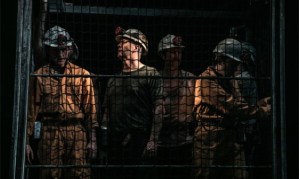Review: Our Country's Good (Nottingham Playhouse)
Ramps on the Moon mount a new production of Timberlake Wertenbaker’s text
"The theatre is like a small republic. It requires private sacrifices for the good of the whole." Ralph Clark’s realisation at the end of Our Country’s Good, after steering a group of convicts through a restoration comedy, could stand as Ramps on the Moon’s 'raison d’être'. His words challenge us to make a theatre for all.
Now in its third year, Ramps on the Moon is an initiative built to bolster the presence of deaf and disabled artists on main stages. Integrating access into its aesthetic, so that sign language and surtitles are woven in and made meaningful, it is, undeniably, a brilliant scheme.
With its concern about who’s afforded access to culture, Timberlake Wertenbaker’s penal colony classic is a canny revival. Charting a group of convicts staging The Recruiting Officer, its images and ideas are sharpened by disability. Here, exile encompasses exclusion, and the convicts, first seen writhing for space in a ship’s hold, are those that society spits out.
Fiona Buffini’s staging draws a distinct line between mostly deaf convicts and their hearing jailors, then drives a wedge between two sides that, literally, speak different languages. Redcoated officers speak over one another, debating whether the play ought to go ahead, the convicts forge a community rooted in care, signing and speaking on each other’s behalf. They eavesdrop on their jailors too, reacting to the way they're dismissed and degraded by the dour, cruel Major Ross (Colin Connor), who regards them as base criminals rather than creative souls.
Signed throughout, language floats to the fore. Wertenbaker’s play is, deep down, about who gets to speak and who goes unheard. It builds to Liz Morden’s silent protest before a probationary panel; her life depending on whether she finds her voice. Her illiteracy contrasts with the human thesaurus John Wisehammer’s verbosity and, played by Tom Dawze, the most sublime signer, he relishes words and elevates them to dance – an art of their own. He toys with ‘latitudinarian’ like a Rubix Cube. It’s beautiful.
While Wertenbaker’s play’s a classic – a syllabus staple – the strength of its story masks the shortcomings of its script. The many subplots can’t be fully fleshed out and most of her characters are plainly one note. Only Tim Pritchett’s Ralph is torn in two directions are once, and as his patrician approach softens he starts signing along with his cast.
It’s a neat touch, but if Buffini exposes the play’s weaknesses, it’s because she sinks too far into sentiment. Neil Murray’s sandy beach setting turns the penal colony into paradise and, rather than enduring hard labour and rations, the convicts could pass for the cast of Channel 4’s Shipwrecked. Romantic scenes play out beneath a luminous full moon and a star-speckled sky, undermining the complexities of relationships across hierarchical divides. Who’s exploiting whom?
The danger lies in going all misty-eyed. Wertenbaker’s convicts must be dangerous as well as dignified. They must merit punishment as much as they deserve respect. Otherwise, its argument’s one-sided and its drama’s depleted. Pity.
Our Country’s Good runs at the Nottingham Playhouse until 24th March, then tours nationwide.
















